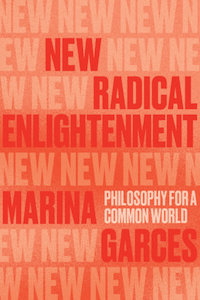本书呼吁一种新的激进启蒙,一种与我们时代轻信和压迫作斗争的态度。今天,当历史时间崩溃,现在变成了一系列灾难时,谁还能保持批判性思维?似乎只有谴责或救赎这两种选择。这种困境隐藏着放弃自由,改善生活条件的可能。是什么样的恐惧和机会主义滋养了这些末世论话语?我们为什么要相信它们?如今,反抗是让一个共同的世界变得可以想象的基本批判态度。
哲学诞生于讨论,诞生于世界观之间的竞争。现代启蒙运动提出了进步的理念,并将其作为普遍价值和模式加以推广。本书阐述了批判性异议作为处于转型期的人文科学的新开端的需求,这种异议建立在多种声音参与影响我们的共同问题的基础之上。人文科学基于对思想重组可居住时间的力量的信任,基于对尊严的共同承诺。不再是延伸垂死的历史的过去,而是敞开怀抱迎接未完成哲学的现在。跳出历史主义,一种未完成的、活着的思想,更新当代哲学的主要问题,并将它们置于行星、后殖民和女性主义框架中。 一个共同世界的哲学。
玛丽娜・加尔塞斯 Marina Garcés
西班牙最受欢迎的哲学家和大学教授。自2002年以来,她推动了Espai en Blanc集体思想计画。 她的思想是对生命作为一个共同问题的承诺的宣言。 这就是为什麽她将自己的哲学发展为对当今世界的思想丶学习和干预形式的广泛实验。http://www.marinagarces.com/
好评
“On the basis of an inventive reading of the history and conceptuality of enlightenment, Marina Garcés arrives at new concepts of knowledge, intelligence and philosophy. Against what she describes as today’s “posthumous condition”, an age of anti-enlightenment between apocalypse and solutionism, the Catalan philosopher calls for a “radical enlightenment”. This concept does not only acutalize Kantian ideas from 250 years ago, but radically multiplies enlightenment thought both in space and in time. As there is a chain of enlightenments in different phases of history, radical enlightenment does not originate only in Europe, but comes from many places, as a work of rebellious weavers from all over the world, with a guerilla philosophy spreading and appearing wherever we least expect it. Listening to the silenced voices of distant places and minor histories, Marina Garcés creates a starting point for future philosophy, a philosophy without a specific territory or origin, a philosophy without dominion.”
—Gerald Raunig, author of Art and Revolution: Transversal Activism in the Long Twentieth Century
“A book that shines indomitably.”
—Manuel Rivas, El País
“Books like this one encourage the reader to grow up in unexpected ways.”
—Vicenç Pagés Jordà, El Periódico
“Marina Garcés insists on demonstrating through her acts the ideas she supports intellectually: philosophy is a transformative and endless power, a way of living.”
—Eudald Espluga, PlayGround
“How frightening, we are losing our enlightenment. The loss of reason is sending us back to before the Age of Enlightenment. The most effective response to overcome this crisis of civilization, according to Spanish philosopher Marian Garcés, is the promotion of a new radical enlightenment, the title of her agile essay-manifesto. A necessary operation “to reaffirm the freedom and dignity of human experience”. Against all induced fear, the fuse of dictatorial and securitarian temptations.”
—Gigi Riva, Il Venerdì di Repubblica
“Garcés’ ambition is thus the return to an imaginary collective enlightenment, in which anonymous clandestine manuscripts are presumably replaced by the militant online samizdat: “Being able to say ‘we don’t believe you’ is the most egalitarian expression of the common power of thought.”
—Antonio Gurrado, El Foglio Quotidiano
“Marina Garcés and her books do not offer formulas or recipes. They argue that philosophy is necessary for the concrete life of each of us and for our societies in crisis. There are those who think that philosophy should be protected and defended as if it were a museum piece or an endangered species. Marina Garcés emphasizes the opposite “philosophy cannot be preserved, it must be practiced and exposed.” Garcés proposes to open ourselves to the present of an unfinished philosophy for a world that shows symptoms of exhaustion.”
—Oriol Puig, El Diario
“Marina Garcés, the rebellious philosopher. Marina Garcés is the thinker of insubordination and social movements. She has taken philosophy beyond the academic world.”
—Matías Néspolo, El Mundo
“A liveable life, a liveable time, a liveable world: life and the human capacity to live it in sustainable, egalitarian, and open ways is at the center of Marina Garcés’ philosophical work. In this book, she harks back to the project of radical Enlightenment to forge weapons for the struggle against the catastrophes of modernization. Garcés reinvents philosophy as a practice of encounter and creation, that takes shared vulnerability as a basis to appropriate common life.”
—Sandro Mezzadra, University of Bologna



